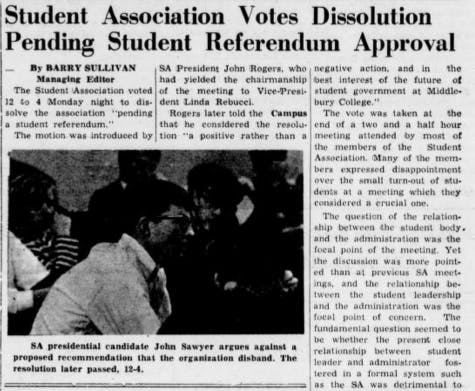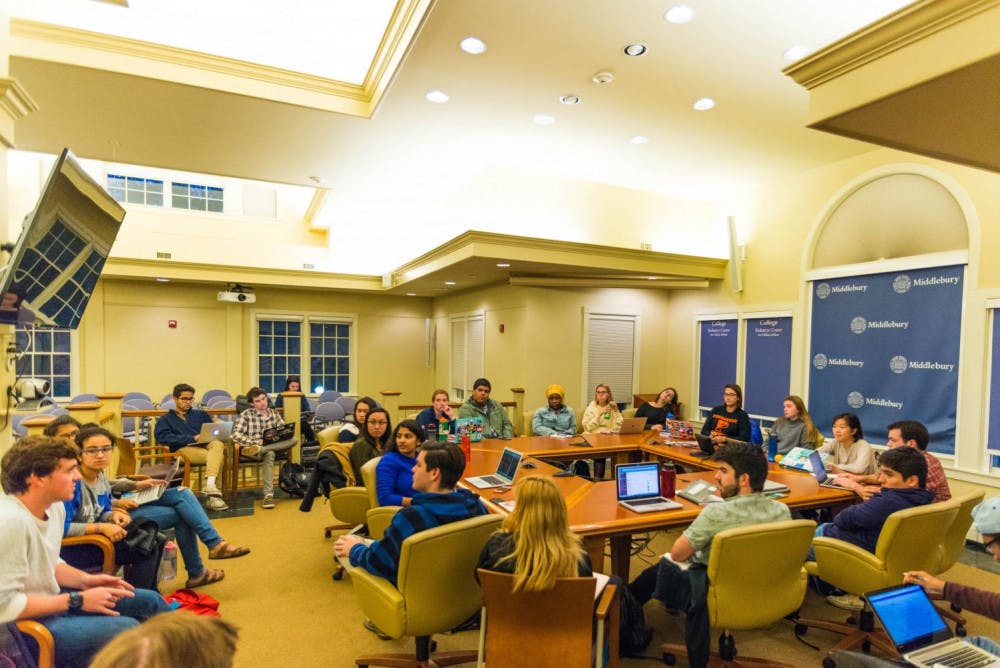At least nine Student Government Association senators have threatened to resign en masse if college officials do not meet a list of 13 demands, a decision that would effectively dissolve the elected body for the remainder of the academic year.
The demands were outlined in a letter emailed Tuesday morning to senior college administrators, including President Laurie L. Patton, with all students copied. Demands in the letter are wide-ranging, and include: “structural changes” to college policy aimed at increasing administrative transparency; “improvements to existing programs” like Green Dot and bringing all buildings into Americans with Disabilities Act compliance; and “new initiatives,” including the creation of an LGBTQ+ Center and a Black Studies department.
In the letter, senators also asked Patton to appear before students at a town hall on Tuesday, April 30 in Mead Chapel. Senior Senator Travis Sanderson ’19 told The Campus that the resignations would occur sometime after then, depending on how and if administrators respond to their demands.
“We just received the SGA communication and are reviewing it. Many of the concerns are already being addressed,” Patton told The Campus Tuesday afternoon. “For others, we believe we can find a way forward to work together. We welcome an opportunity for engagement with SGA and have already reached out to its leaders. We will be providing a response, which we hope we can work on collaboratively, next week.”
While not every member of the SGA Senate has promised to resign, all members approved sending the letter to administration, Sanderson said. The resignation of at least nine of the 18 senators would mean the absence of a quorum at all future meetings, and thus the effective dissolution of the elected body for the remainder of the academic year. With the threat of resignation, senators hope to send a message about inadequate student representation in administrative decision-making.
“It has become evident that the connection between the administration and students has been reduced to a one-way street,” they wrote. “The administration has failed time and again to listen to the desires of its students.”
Their demands, titled “Thirteen Proposals for Community Healing,” are aimed to improve student representation and promote community healing on campus, including several proposals that had previously been brought to the administration but were either tabled or overlooked.
“There is a long history of SGA recommendations being ignored,” Sanderson said.
As it stands now, SGA resolutions are mostly symbolic recommendations to college officials — no real student check exists on administrative authority. But in the letter, the senators claim a right to participate in administrative decisions.
“Our tuition funds the college, and the college’s purpose is our education,” senators wrote. “Middlebury College is first and foremost a school, not a corporation. Why is it that decisions are often made with little to no consent or involvement from us in our own school?”
In an op-ed published by The Campus Tuesday afternoon, SGA President Nia Robinson ’19 supported the actions of senators regardless of where they stand and promised to keep advocating for students in her role.
“For the final weeks, I will continue to support those who come to me and offer advice to any students who will listen. I will continue to advocate for them whether in trustee or SLG meetings when I am the only student in the room,” Robinson wrote. “My sole goal is, and has always been, to help leave this campus in a better state than I found it.”
Reaching a Breaking Point

The letter enumerates instances of administrative neglect of student proposals, from the failure to make Middlebury a sanctuary campus in 2016 to the recent cancellation and fallout from the the controversial scholar and Polish politician Ryszard Legutko’s scheduled lecture, which also resulted in the cancellation of a peaceful, non-disruptive student protest scheduled to take place outside. In the letter, senators condemn the administration for waiting until Friday, April 19 to unequivocally say that the student protesters were not the security concern. That delay, they write, caused misinformation about the protest to spread in the national media.
Senior Senator Alexis Levato ’19 said that the SGA saw the period following the lecture cancellation as an opportune moment to act.
“I think we cared about these issues as individuals, and cared about them as SGA, but didn’t feel there was a possibility of actually doing anything until this happened,” she said. “Which I think speaks to the way the administration is structured, that it only really allows students to be activists in moments in which it’s blowing up in their faces.”
Varsha Vijayakumar ’20, a junior senator and the SGA president-elect, also saw the moment as a culmination of SGA and student activists’ frustrations.
“I personally reached a point where I feel like the administration has been taking advantage of our empathy, and I think that’s unfair to put a disproportionate burden on students to work hard to make this place more like a home for students,” she said. “We’re at a point where it’s not just the SGA, but also a lot of student activism and mobilization that is pushing for change. And we want to support that.”
The letter alleges that it was only when administrators heard that senators were discussing dissolution that they said, in an email sent by Provost Jeff Cason and Dean of the Faculty Andi Lloyd, and forwarded to students by Dean of Student Baishakhi Taylor, that “our assessment of the potential safety risks of Wednesday’s planned lecture did not reflect concerns about threats from student protesters or students attending the event. Rather, we were concerned about the safety of those participants.”
“We are extremely disappointed that only after hearing threat of SGA’s dissolution did an administrator publicly clear organizers of blame as the unnamed security threat that led to cancellation of the Ryszard Legutko event,” the letter reads.
No member of the SGA reached by The Campus would comment on the record about the alleged interaction with an administrator.
Vetting Speakers
After The Campus posted the letter online Tuesday, debate ensued over the senators’ third proposal, which calls for the creation of a due diligence form that includes questions aimed to determine whether a speaker’s views align with Middlebury’s community standards, “removing the burden of researching speakers from the student body.”
The proposal also asked for each academic department to create a student advisory board that would have access to a list of invited speakers one month in advance in order to provide feedback when necessary.
“This is absurd. Students should relish the chance to research speakers, to interact with speakers, to debate with speakers,” Rich Cochran ’91 wrote on The Campus Facebook page. “I am shocked that the SGA would publish this list of unilateral demands.”
Sanderson clarified to The Campus that the proposal would not bar speakers from campus. Instead, the answers to the form would be made public to inform the community in advance of the speaker’s arrival.
“If anything, this ensures a greater degree of informed free speech and assembly,” he said. “Critics are arguing that we want to keep speakers from campus, which is incorrect.”
The Process
Senators first began to discuss what would eventually become the letter on Wednesday afternoon in the wake of the Legutko cancellation. Over the weekend, they began to gather feedback from student leaders, including the heads of cultural organizations and leaders of the Legutko protest. Some senators spent most of Friday drafting the letter, which they then shared with all senators.
Vijayakumar was one of the students who spent the better part of the day working on the letter. She was also notified around midday that she had won the SGA presidency.
“I celebrated for maybe 20 minutes, but that was not my focus,” she said. “It’s the last thing I’m thinking about. Even on Friday, the entire day, I was working on these demands.”
On Sunday, April 21, senators went into executive session during and following their regularly scheduled meeting to discuss the draft. The session lasted one hour.
The following night, senators hosted a student-only town hall in Mead Chapel to gather feedback on the letter and demands. Robinson opened the forum by reading the demands and introduced the senators’ proposed plan to resign. Then, attendees divided into focus groups to discuss further. Each group parsed the drafted demands and suggested modifications to senators, who led the groups. Senators then met later that evening to finalize the letter based on student feedback. According to Vijayakumar, they discussed the suggestions made on every point, and identified major trends in feedback in an attempt to incorporate as many as possible.
In an interview with The Campus, Sanderson stressed the senators’ desire to involve other members of the community in the draft. He said the SGA is only one forum in which students have tried and failed to work with administrators to address the concerns of the student body. Specifically, he cited the title of the letter, which was recommended by members of the community. They also received emails with suggestions and ideas from students who could not attend the town hall.
When asked about the college’s recent work with students to divest from fossil fuels by 2028, Sanderson said that the administration did not adequately credit student activists in their announcement.
“In the case of divestment, it was a massive student campaign for a long time, but it was co-opted by the administration in the end,” he said. The letter addresses this concern: “Students who work on these initiatives alongside faculty must receive credit for their work, and will not be excluded from these initiatives once faculty begin working on them.”
When reached for comment, Community Council Co-Chair John Gosselin ’20 said he supported some of the senators’ demands and disagreed with others.
“I disagree with the general strategy of demands and dissolution because it has forced the student government to express opinions too quickly and without any nuance, reflection, or evidence of serious discussion, despite the best efforts of the SGA meeting on Sunday and the poorly attended student town hall on Monday,” he said.
History Repeats Itself
In 1967, members of the Student Association, then equivalent to the SGA, took a similar approach to addressing feelings of powerlessness vis-à-vis the administration. Members saw the body as a mouthpiece for administrative decisions and doubted its own ability to advocate for students, and voted to hold hold a campus-wide referendum on the body’s dissolution. The proposal passed overwhelmingly among students, who voted 407-70 in favor. Two years later, the current iteration of the SGA, newly-endowed with more representative and legislative capacities, formed.
Today’s SGA is drawing inspiration from its predecessors’ decision.
“When circumstances mirror those faced by student leaders half a century ago, we must consider options similar to the ones they faced,” senators wrote. “In the words of Brian Maier, the equivalent of an SGA senator at the time, ‘we must take power rather than ask for it.’”
But senators are also wary of the unintended consequences their predecessors’ actions had on the student body. Last time, dissolution of the Student Association left student organizations without funding. This time, the resignation of senators would leave the other components of the SGA intact, including the SGA President’s Cabinet and the SGA Finance Committee, which allocates the student activities budget.
“We don’t want to hurt students and nullify all the projects they’ve spent a full semester working on. That’s definitely not our intent,” Levato said. “I think we’re learning from that decision in order to make sure that students are only positively affected by this.”
Senators still think, though, that the threat is substantial enough to warrant a serious response from the administration. Vijayakumar believes the student body is on board.
“We do feel like this is the most productive way to enact change right now on this campus,” she said. “We wouldn’t be doing it if we didn’t think so.”




